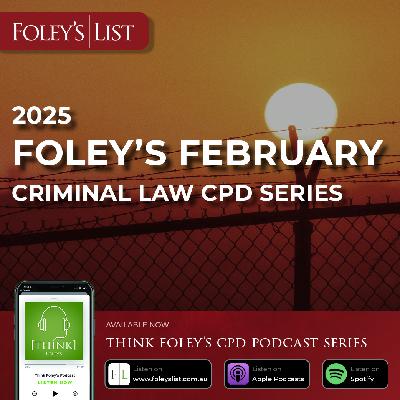Discover Think Foley's
Think Foley's

132 Episodes
Reverse
In this Daze in Court episode, Foley's List barristers Rohan Hoult, Amy Yu, and Partner Tim Gough from Kennedy Partners explore the growing reliance on the “Bank of Mum and Dad” in today’s property market. They cover resulting trusts, loan agreements, and the presumption of advancement, highlighting what practitioners need to know when advising clients.
In this Daze in Court episode, Foley's List barristers Rohan Hoult, Eliza Tiernan, and Alex Metherell tackle the complexities of add-backs in family law matters, examining their impact on practitioners and the property pool. They also provide essential guidance on the rules of appeal and court etiquette to help legal professionals navigate the judicial system.
Reflections and commentary on the Dynamic Therapeutic Inclusive Intervention Conference program: A must-know about modern option for every family lawyer guiding clients through the maze of assessment and intervention options. In this episode, Foley's List Barrister Laura Colla, speaks with Child Expert Lisa Bottomley, Clinical Psychologist Vincent Papaleo, and Psychiatrist Dr. Timothy Entwisle. They delve into the Therapeutic Inclusive Intervention Conference program (TIIC), a multidisciplinary initiative co-developed by Bottomley and Papaleo. This program is designed to assist families caught in high-conflict parenting disputes within the Australian family law system, and they discuss its structure, objectives, features, and accessibility.
In this Daze in Court episode, Foley's List barristers Rohan Hoult and Robyn Wheeler offer perceptive commentary from the Bar. They explore recent cases and legislative developments, sharing practical strategies and candid insights into the challenges of effective advocacy for clients in complex legal matters.
ln this episode, Foley’s List Barristers Emma Peppler and Eliza Bergin provide a crucial update on the implementation of Victoria's Environment Protection Act 2017. They discuss recent developments in Supreme Court judgments and Tribunal decisions, as well as key features of EP Act proceedings within the Tribunal. Access the previous episode here: A New Phase of Environmental Protection in Victoria: Environment Protection Act 2017
In this Daze in Court episode, Foley's List Barristers Rohan Hoult and Kim Southey provide a comprehensive overview of the significant amendments to Australian family law that took effect in June 2025. They unpack the key changes in domestic violence protections, property settlements, and the new legal considerations for companion animals, offering valuable insights for families and legal practitioners alike.
In this Daze in Court episode, Foley's List barristers Rohan Hoult, Andrea Skinner and Principal Will Stidston from Barry Nilsson explore the evolving role and drawbacks of artificial intelligence, particularly its impact on generating and evaluating documents. They also discuss expert evidence and the practical challenges of engaging a shadow expert in complex litigation.
In this Daze in Court episode, Foley's List barristers Rohan Hoult, Bronia Tulloch and Chief Clerk Andrew Turner sharing about their journey and the progress in Foley’s List, and dive into a conversation with Bronia about the appeal process in court.
ln this episode, List member Aaron Lane and Steven Pettigrove from Piper Alderman break down 2024 Federal Court cases of Blockchain and Digital Assets. They also discuss global trends, industry regulations predictions for 2025, and what evolving policies mean for investors, businesses, and innovators.
In this Daze in Court episode, Foley's List barristers Rohan Hoult and Simon Fuller sit down alongside solicitor Raffaella Oliva from Hope Earle Lawyers to share and discuss some papers they have written. Raffaella explores adult children seeking access to their parent’s file, drawing from her article Through the Looking Glass. Simon delves into the strategic use of third parties in property proceedings.
This is a recording of session 6 of the 2025 foley's February criminal law series. In this session, Paul Holdenson KC and Jack O'Connor discuss key appellate decisions on latent ambiguity in evidence, jury direction failures, the admissibility of tendency and character evidence. It highlights cases where judicial errors and procedural breaches affected trial outcomes, refining criminal law interpretation and procedural fairness.
This is a recording of session 5 of the 2025 foley's February criminal law series. In this session, Michael Stanton SC, Katarina Ljubicic and Patrick Hurst discuss the legal framework governing admissions under Part 3.4 of the 𝘌𝘷𝘪𝘥𝘦𝘯𝘤𝘦 𝘈𝘤𝘵 2008 (Vic), including key statutory provisions, police interview techniques, and protections for vulnerable individuals. It also examines case law, such as Ridley v The King [2024], and discusses the admissibility of covertly obtained admissions, fairness considerations, and emerging legal developments.
This is a recording of session 4 of the 2025 foley's February criminal law series. In This session, Richard Edney, Ran Zaydan & Edwina Dane provide a thorough guide to preparing a strong defence by examining the prosecution brief, ensuring complete disclosure, and creating a detailed chronology. It emphasizes the importance of the cultural and historical context, involving clients in their defence, and assessing the effectiveness of police investigations.
This is a recording of session 3 of the 2025 foley's February criminal law series. In This session Tim Marsh, Maddie Lees & Thomas Bell provides a detailed guide on handling cases involving the defence of mental impairment in criminal proceedings. It also includes case studies and references to relevant legal provisions and practice notes to guide practitioners through the process of defending clients with mental impairments.
Commercial landlords must give notice to a tenant before exercising a right of forfeiture for breach of a lease. That requirement can be modified by the terms of the lease. In this podcast, Erik Dober discusses how landlords can draft an effective notice, and how a tenant can respond.
Open and Shut Case: Open Justice, Closed Courts and Suppression Orders for Criminal Lawyers This is a recording of session 2 of the 2025 Foley's February criminal law series. In this session, Ruth Champion, Natalie Simpson & Louis Andrews discusses the principals of open justice and presents five key questions to ask before applying for a suppression order, emphasising a need for thorough case preparation, effective decision-making, and having a draft order ready to minimise interference with court procedures. Ruth Champion appears for the prosecution and defence, and, in both trial and appellate matters. Ruth has particular experience in subpoena proceedings including on claims of public interest immunity and legal professional privilege. Natalie’s primary practice is in criminal law, but she also accepts briefs in quasi criminal, family law and public law matters. Natalie has significant experience in a range of crime types including complex drug matters, child sex offences, human trafficking, and white-collar crime. Louis Andrews has a broad practice in criminal law and public law. In his criminal law practice, he accepts briefs to prosecute and defend. Louis has specialised experience in the intersection of the criminal law and media law, including contempt and suppression orders.
Issues of Complicity – How to be Guilty Without Pulling the Trigger This is a recording of session 1 of the 2025 Foley's February criminal law series. In this session, Foley’s barristers Neill Hutton SC, Daniel Ryan & Megan Styles address how individuals can be held criminally responsible for an offence without directly committing the act, through aiding, abetting, or encouraging the principal offender. This session covers legal interpretations and rulings concerning complicity in criminal offences under specific sections of the law.Top of FormBottom of Form Neill Hutton SC has specialised in conducting criminal trials for over 20 years, he is a Victoria Legal Aid Criminal Trial Preferred barrister and holds the Indictable Crime Certificate. Daniel Ryan accepts briefs from both prosecution agencies and defence and has significant experience in the conduct of bail applications, plea hearings, contested hearings, Contest Mentions, intervention order applications, forensic procedure applications. Megan Styles accepts briefs in a broad range of matters. She has a particular interest in matters involving commercial and white-collar crime, asset confiscation, proceeds of crime, law enforcement, insolvency law, banking and finance and financial investigations/compliance.
In our first installment of the Daze in Court podcast of 2025, Foley's List barrister Rohan Hoult invites Daniel Myers from Schetzer Papaleo Family Lawyers to share his insights and experiences in the family court from a solicitor's perspective.
List member Laura Colla is joined by Olivia Grobtuch from Kennedy Partners and Stephen Foley of eBrief Ready to share insights from both barristers' and solicitors' perspectives on best practices for managing electronic documents in court. They explore some pros and cons of using eBrief Ready and discuss effective handling of eBriefs, Tender Bundles, Court Books, and other court documents and how to achieve the best result and a good experience for all concerned.
In this episode, Lucy Line and Ruben Clark discuss the principles of statutory interpretation, with a particular focus on how those principles can be applied in a regulatory environment. First, a detailed overview of the tools and tricks that can help practitioners read and construe legislation, emphasising the importance of this skill for all practitioners. Then, a practical examination of how to interpret statutory 'notice to produce' powers, to assist regulators in drafting these notices, and to guide recipients in their responses.













